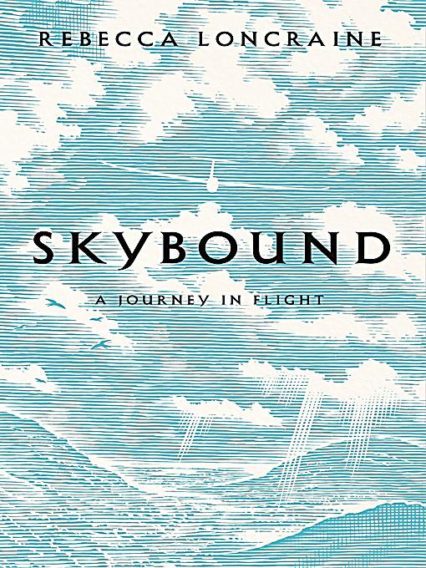Adam Somerset reviews Skybound, a soaring book from Rebecca Loncraine, remembered by some of Wales’ finest writers at a live event at Gregynog Hall.

At the second Montgomery Literary Festival this summer, held at Gregynog, a founder committee member Amanda Jenner hosted a sprightly discussion with three authors. The title of the session was “A Quarter of Wales: Writing Powys”. The county makes up twenty-three percent of Wales but is home to only three percent of its people. From its different corners are gathered Myfanwy Alexander, Tom Bullough and Horatio Clare.
Myfanwy Alexander combines her authorship of comic fiction like Bloody Eisteddfod (Gwasg Carreg Gwlach, 2017) with the tough role of Powys Cabinet Member for Education. From the viewpoint of her home in Llanfair Careinion, she is swift to do away with the notion of being a writer of Powys at all. Her geography is densely local; Machynlleth, for instance, is a place that is far away.
Tom Bullough likewise disavows being a writer of Powys. He is of Radnorshire. His fourth novel Addlands (Granta, 2016) follows seventy years as they unroll for a Radnorshire hill farm. Horatio Clare similarly is of the Black Mountains. The enlivened conversation swirls around places and writers: Heledd of Powys, Arthur Machen, R S Thomas, Russell Celyn are all mentioned.
And Rebecca Longcraine. Skybound says Horatio Clare, is a wonder, one of those books which, after the reading, leaves the world looking not quite the same again. He is right. The subject of Skybound is the part of the world that is above us, the thin veil of air wrapped around the earth. Rebecca Loncraine took to gliding in the last years of her life. Skybound was not quite finished when she died, aged 42, in September 2016. Her mother provides a short afterword to her book.
The flights in the glider start in the Black Mountains, the place of the family home, and move to New Zealand and Nepal. The book is clear in its motivation. The treatment for her first illness was gruelling. “My life had unravelled,” she writes. A partner had gone and she was four stone lighter. Her hair was wiry and she bore a scar from surgery. The result “made me feel excluded from nature… rejected from the natural order of things… broken and scarred”. Metaphorically, “the ground had already disappeared from beneath me”. The response was to fly. “I have been needing to find a language, a context, through which my suffering can speak.”
She finds another metaphor in space travel for the arc of escape and return. The astronauts on Apollo 13 had to go the dark side of the moon to get a slingshot effect from the moon’s gravity to gain enough momentum to make the return to earth. Early on in flight training she is taught that it requires release from the body. Sensation is unreliable; the glider pilot must learn to have no trust in the physical and sensory information that is received once in the air. The information from the instruments is reality.
With learning she becomes conversant in the language of air. The air that hits the earth in ascent is made of different kinds. There is ridge air, thermal lift, convergence lift, mountain wave. From above, the landscape of childhood territory is revealed in a different way. Neolithic strata, cairns and burrows, ripples, dents, ditches assert themselves. The land seen from above also becomes territory of connection. “The more I look at it, the more the scar on the hill and my own scar start to feel like openings for painful truths to enter. Illness is part of nature, as are hill fires.”
Skybound has its illuminating introspection to it, but it is interleaved with description. She is awed by the scale of sky, the stratosphere and troposphere. A cumulus cloud, she writes, is a floating lake and as heavy as one. It has a latent heat equivalent to three hundred tons of explosive. She reaches into the history of gliding. The power of lift offered by thermals goes back to 1930. A pioneer pilot with a wooden leg, Wolf Hirth, took off from a quay in New York City. He flew over the River Hudson and reached an altitude of one thousand feet.
Gliding is peak experience where time becomes elastic. In New Zealand she flies over Mount Cook; at 22000 feet it is a height without oxygen nudging towards the altitude of jet aircraft. She finds herself within the full circle of a rainbow. She observes in a tutor the relation of human and artefact: “He plays his glider like an instrument, like it is an extension of himself”. When she acquires a similar proficiency “I caught the wave, you don’t even think about your hands or your feet.”
Skybound is lifted by the quality of its writing. When the wing of a bird appears silver-white it is catching the light that is reflected from ice far below. The judgement of Horatio Clare, delivered from a small stage in a grand room in Gregynog is quite correct. Skybound is book with the power to transport.
Skybound by Rebecca Loncraine is available from Pan MacMillan
Adam Somerset is an essayist and a regular contributor to Wales Arts Review.











